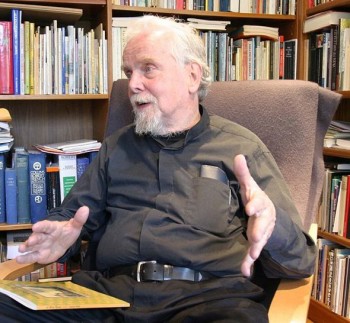Search results for "2010/02/2011/04/2009/10/writing-and-power"
Damned nihilists
30 December 2008 | Extracts, Non-fiction
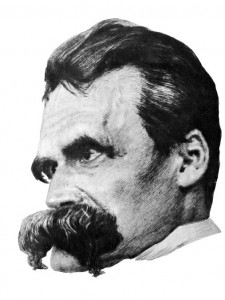
Much misunderstood: father of the superman, Friedrich Nietzsche.
The term nihilism is often bandied about, but often badly misunderstood. In extracts from his new book, Ei voisi vähempää kiinnostaa. Kirjoituksia nihilismistä (‘Couldn’t care less. Writings on nihilism’, Atena, 2008), the social scientist and philosopher Kalle Haatanen discusses the true legacy of Friedrich Nietzsche, nihilism’s high priest
The word nihilist is derived from the Latin: ‘nihil’ means, simply, ‘nothing’. When someone is labelled as nihilist or seen as representing nihilism, this has always been a curse, a mockery or an accusation, whether in philosophy, politics or everyday conversation. More recently, the word has generally been used to refer to people who do not believe in anything – people whose world-view is without principle, without ideals, barren. More…
New from the archive
17 March 2015 | This 'n' that
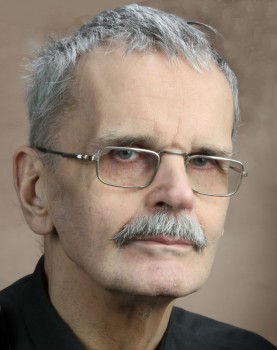
Gösta Ågren. Photo: Studio Paschinsky
Back in the day, in one of our periodic excursions into merchandising – the main criteria were that our goods should be flat (to fit into an envelope) and, of course, literary – we printed Books from Finland t-shirts. They were wildly popular – we must have sold, oh, dozens of them – and top of the list was a shirt with a laconic couplet by Gösta Ågren: ‘Don’t worry / it will never work out.’
Writing in Swedish and hailing from a small village in Ostrobothnia, in the far north-west of Finland, Ågren (born 1936) is the author of poems, essays and biographies. He may often choose to adopt the persona of a country curmudgeon, but the laconic tone of his poems belies a tenderness, a universalism, and an underlying political commitment, that speaks of a love of the world, a desire to make it into a better place.
The volume from which these poems are taken, Jär (‘Here’, 1989), won the Finlandia Prize for Literature in 1989.
*
The digitisation of Books from Finland continues, with a total of 372 articles and book extracts made available online so far. Each week, we bring a newly digitised text to your attention.
Dracula fights for Finland
16 June 2015 | This 'n' that
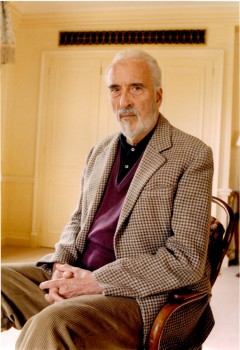
Christopher Lee. Photo: Devlin crow / CC BY-SA 3.0
Actor Christopher Lee loved Finland and knew the Kalevala
Among the obituaries of Christopher Lee, the celebrated actor who died last week at the age of 93, one fact has remained strangely overlooked: his connection with Finland.
Lee (born 1922) specialised in monsters and villains; his most famous roles included Dracula, the Mummy, Frankenstein’s monster, Count Dooku in Star Wars and the wizard Saruman in The Lord of the Rings.
Writing in the Helsingin Sanomat newspaper, Veli-Pekka Lehtonen reveals that Lee knew Finland well. As a very young man he had volunteered for service in the Winter War of 1939; the British soldiers’ skiing skills, however, made them less than useful and they were sent home.
Lee also had an extensive knowledge of the architecture of Helsinki, and loved the Finnish national epic, the Kalevala.
That love came full circle in his role in The Lord of the Rings. J.R.R. Tolkien, the trilogy’s author, was also a Kalevala fan – the inspiration for his work on the kingdom of Middle Earth lay in the Kalevala’s story of Kullervo. As he wrote to his friend, the poet W.H. Auden, in 1955, ‘the beginning of the legendarium… was an attempt to reorganise some of the Kalevala, especially the tale of Kullervo the hapless, into a form of my own.’
Tolkien, a professional philologist, particularly loved the Finnish language. He described finding a Finnish grammar book as being like ‘entering a completely new wine-cellar filled with bottles for an amazing wine of a kind a flavour never tasted before.’
Christopher Lee may not have known Finnish, but he had clearly sampled the same wine.
Juha Virta: Sylvi Kepposen pitkä päivä [Sylvia Prank’s long day]
3 March 2009 | Mini reviews
 Sylvi Kepposen pitkä päivä
Sylvi Kepposen pitkä päivä
[Sylvia Prank’s long day]
Kuvitus [Ill. by]: Marika Maijala
Helsinki: Otava, 2008. 33 p., ill.
ISBN 978-951-1-22373-3
€ 17, hardback
The long, narrow shape of this picture book is justified, as it literally gives the reader a clear perspective on its illustrations. Sylvi is a little girl whose legs one day grow so long that she is able to leap into space. Sylvi becomes a media phenomenon and the object of universal astonishment – until her legs return roughly to their former size. The book, by Juha Virta (born 1970) and his partner Marika Maijala (born 1974), owes much to nonsense writing and Lewis Carroll’s Alice in Wonderland, but the story and the pictures are an amazingly well-balanced combination, expressing humour, unceremonious wonder and a childlike ability to derive pleasure from moments of absurdity.
Literature international
7 May 2010 | In the news
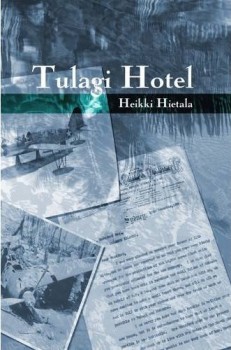 A novel set on the islands of the Pacific and Indian Oceans, Tulagi Hotel, was published by Dragon International Independent Arts (Diiarts) in London on 12 April. The writer is a native Finn, Heikki Hietala, who wrote his book in English.
A novel set on the islands of the Pacific and Indian Oceans, Tulagi Hotel, was published by Dragon International Independent Arts (Diiarts) in London on 12 April. The writer is a native Finn, Heikki Hietala, who wrote his book in English.
Hietala, a translator and lecturer at Haaga-Helia University of Applied Sciences in Helsinki, began writing his novel in 1996, and in 2008 a refined version was uploaded onto the HarperCollins website, Authonomy, where Tulagi Hotel rose to number 15 in the popularity ratings for novels – in a selection of some eight thousand. It is now available also in an electronic version for Kindle.
The story takes place in the years of the Second World War and after; a US Marine fighter pilot from the Midwest, Jack McGuire, settles down on the Solomon Islands and begins to run a hotel. The arrival of his wartime best friend’s widow, Kay Wheeler, disrupts his orderly civilian life.
We congratulate the author for his rare achievement – however, we’d like to point out a small error. Tulagi Hotel is advertised as ‘the first book written in English by a Finn to be published outside Finland’, this is not quite true, as Anselm Hollo, a native Finn, translator and poet living in Colorado, has been publishing poetry books in English in the UK and the US since the 1960s. (Here are samples of his poems:)
Dog
30 September 2002 | Archives online, Fiction, Prose
A short story from Afrikasta on paljon kertomatta (‘Much is still untold about Africa’, WSOY, 2002). Introduction by Maria Säntti
You’re exactly what a dog should be, I told him. You’ve a black ear and a white one. You’re not too big and you’re not all teeth.
I stroked his black-spotted coat. He wagged his curly tail.
I crouched down. He squeezed up against my chest. I sent my ball rolling along the stairway corridor. He shot after it, accidentally running over the top of it. As he braked, his claws screeched on the tiles. Sparks went flying.
He snapped the ball in his jaws, nibbled its plastic and sent it back with a snuffle. His tongue was wagging with glee. Next I wanted to roll the ball so he wouldn’t get it. It bumped against the iron banister and went off in a different direction, skidding under the dog’s belly. He turned and dashed after it. More…



